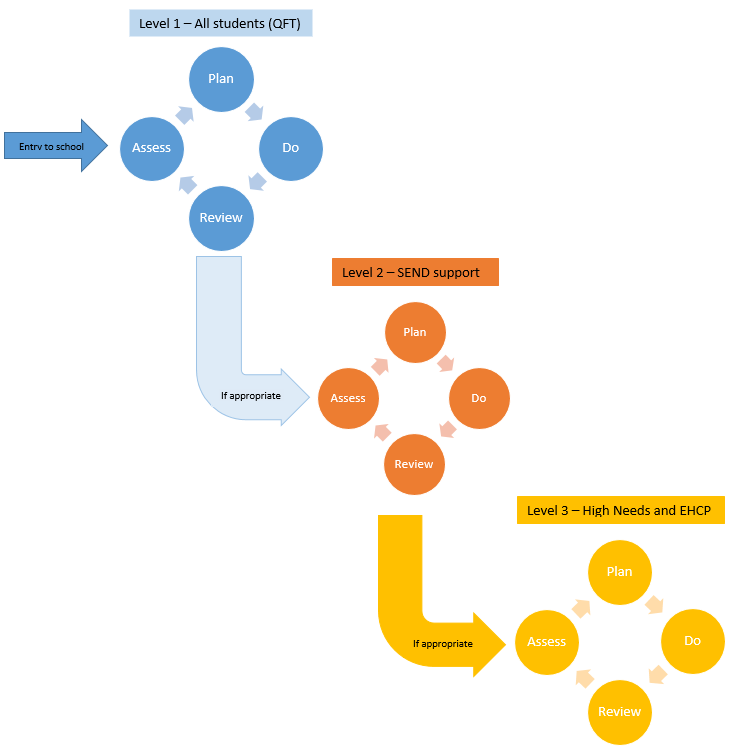SEND & Inclusion
The SEND department is committed to providing a positive future for all. We believe that every student should be valued as an individual, and that all should be able to achieve the best they can irrespective of background or prior attainment.
Introduction
We understand the difference between equality and equity, and aim to match provision with individual need, ultimately aspiring to remove barriers to learning by equipping students with the tools they need to succeed and enabling all to become independent learners.
We have a whole school approach to Special Education Needs and Disabilities (SEND) which upholds the right of every child to a full and balanced curriculum, shaped as necessary to support their individual needs.
All staff in school have a responsibility for maximising achievement and opportunity for all our students, enabling them to become confident individuals who make a successful transition in to adulthood and lead fulfilling lives. We are committed to ensuring that all our students with SEND get the support they need to succeed and can engage in all the activities of the school.
The SENDCo, Miss Alex Pearson, works with a team of Teaching Assistants and all teachers to provide for the individual learning needs of all students.
How we identify need and plan support – three levels of assessment and support

Facilities and Support
- Well-resourced teaching rooms
- Small quiet rooms, for exams and visiting professionals
- Maths Interventions
- Literacy Interventions
- ‘The Bridge’ (see below)
- Pastoral care for all students
- Asdan course - alternative to one GCSE course (Year 10/11)
- Functional Skills Maths and English – alternative to GCSE course (year 10/11)
- Reading Buddy Scheme
- Handwriting/Typing support
- Key Worker for identified students
- Access arrangements for identified students in formal examinations in KS4 and KS5
The Bridge – supporting Mental Health
The Bridge is an intervention space for students who are struggling to meet the demands of the school environment. Our driving purpose is to support students back into lessons and equip them with the necessary skillset to succeed in all areas. To implement this vision, The Bridge is a space where time limited and specific interventions are provided to a much larger number of students. This will ensure students are receiving the best possible, long term targeted support overseen by Ms Chisholm and Ms Chester.
The Bridge is accessed by students on an invite only basis and does not operate as a ‘drop in’ or ‘time out’ space, allowing more structured time with those students in need of interventions.
The Bridge will allow students to proactively manage their own emotions and mental health needs, and in doing so, will equip them with the long-term tools and techniques needed to build resilience and be ambitious, honouring our PWS commitment to learning for life.
Further Information
The SEN team provides additional strategies and support for students who have been identified as having Special Educational Needs. In accordance with the SEN code of Practice (2015), children identified as having additional needs require provisions to be made that are “additional to and different from” the core provision of the academy.
We have a secure database available to all staff. This provides both up-to-date information about the learning needs of individual students and general information about specific barriers to learning.
We maintain close and regular links with outside agencies, medical staff and other professionals
We provide careful advice and support for Transition at 11+, 16 + and 18+.
We value partnership with parents and are committed to working in close co-operation with parents for the good of each student. Parents of students with special educational needs will be contacted and meetings arranged to discuss proposed provision. All parents are encouraged to contact the school as and when they have concerns. Parents of students with an Education Health and Care Plan (EHCP) are always invited to annual review meetings in addition to the usual Parents' Evening.
Who to contact?
Miss Alex Pearson
Special Educational Needs and Disabilities Coordinator (SENDCo)
alex.pearson@pws.emat.uk
Related documents
GOV.UK SEND Code of Practice




